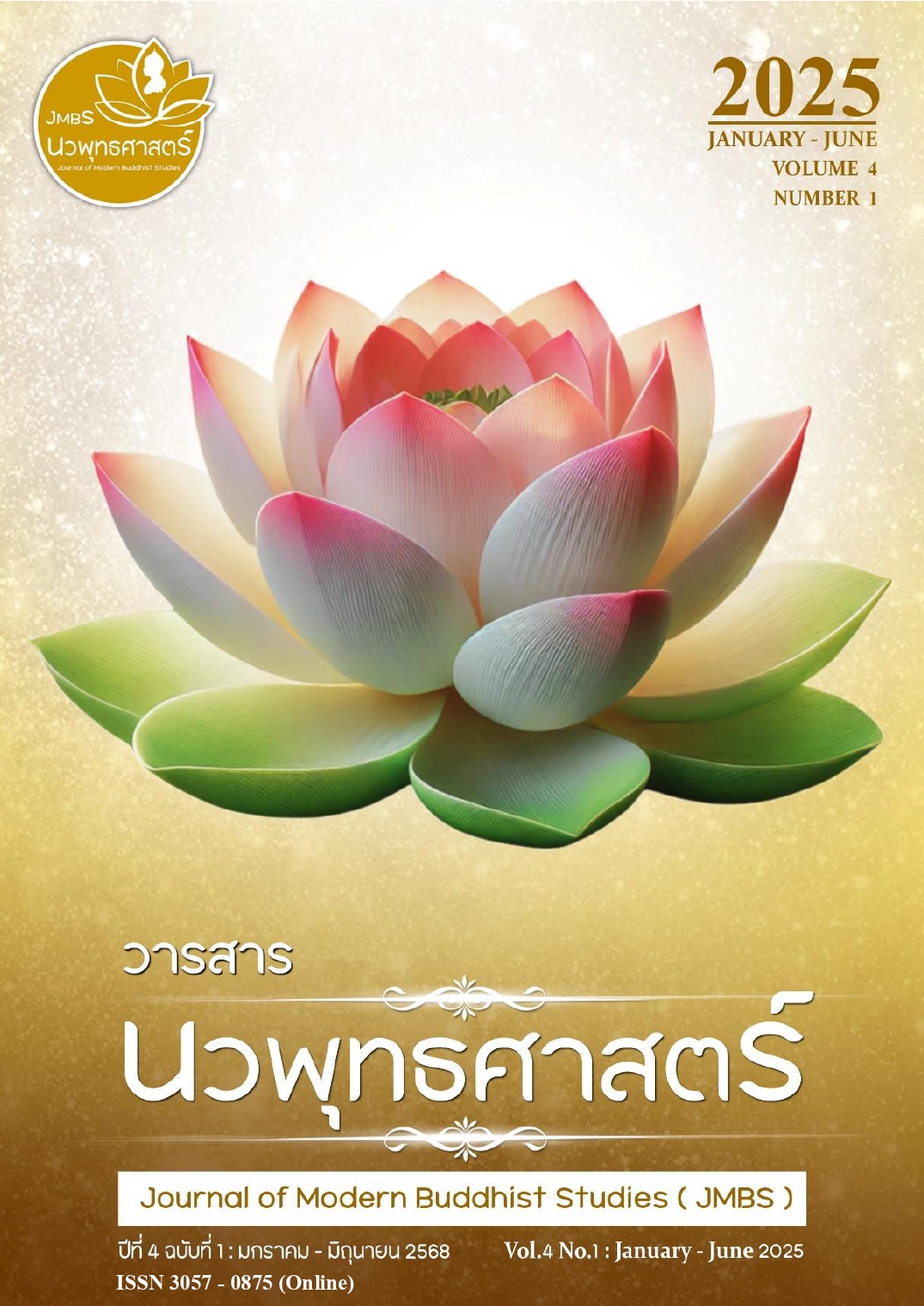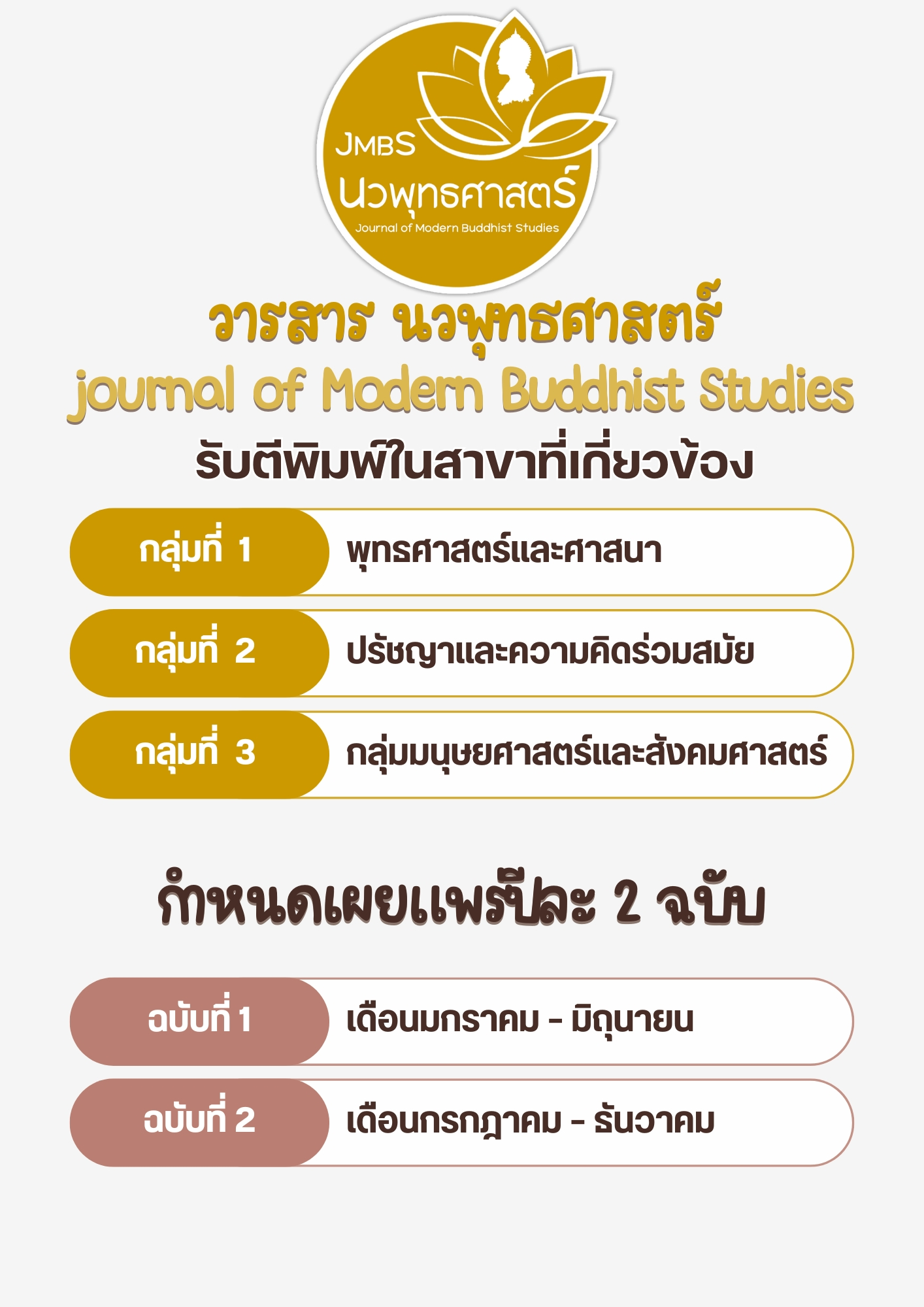The Analysis of Atakkāvacara Dhamma in the Buddha’s Enlightenment
Keywords:
Keywords : Atakkāvacara dhamma Dependent Origination Epistemological theoryAbstract
The enlightenment of the Buddha was a pivotal event that led to the dissemination of the Dhamma, the teachings of Buddhism. After attaining enlightenment, the Buddha contemplated the truth he had realized, particularly the Four Noble Truths and Dependent Origination, which explain the arising and cessation of suffering. Although these teachings are profound and difficult to comprehend, out of his great compassion, the Buddha resolved to share them with those who possessed the wisdom to understand and attain them. Dependent Origination and Nibbāna are considered atakkāvacara dhamma, meaning they cannot be fully grasped through mere logic or common reasoning. Instead, they require insight developed through the practice of meditation and Vipassanā. The Buddha emphasized that understanding these teachings is not a matter of intellectual reasoning but a realization achieved through direct insight. Nevertheless, Dependent Origination can also be examined in daily life as a means to reduce attachment and wrong views.This article presents an analysis of the Dhamma realized by the Buddha through the lens of Pāli grammar and epistemological theory, highlighting that the term "Dhamma" as used by the Buddha encompasses both Dependent Origination and Nibbāna. Such an approach to studying the Dhamma allows for a more accurate and comprehensive understanding of the profound meaning of the Buddha’s words.
References
นาคารชุน. (2478). รัตนาวลี แปลโดย พระสารประเสริฐ. กรุงเทพมหานคร.
ประยงค์ แสนบุราณ. (2547). ปรัชญาอินเดีย. กรุงเทพมหานคร: สำนักพิมพ์โอเดียนสโตร์.
พระพุทธโฆสเถระ.(2532). วิสุทธิมรรคฉบับภาษาบาลี ภาค 1. กรุงเทพมหานคร. โรงพิมพ์สำนักค้นคว้าทางวิญญาณ.
พระพุทธัปปิยมหาเถระ.(2547). ปทรูปสิทธิปกรณ์. กรุงเทพมหานคร. บริษัทธนาเพรสแอนด์กราฟฟิค.
มหาจุฬาลงกรณราชวิทยาลัย. (2539). พระไตรปิฎกภาษาไทย ฉบับมหาจุฬาลงกรณราชวิทยาลัย. มหาจุฬาลงกรณราชวิทยาลัย.
มหาจุฬาลงกรณราชวิทยาลัย. (2539). พระไตรปิฎกภาษาบาลี ฉบับมหาจุฬาลงกรณราชวิทยาลัย. มหาจุฬาลงกรณราชวิทยาลัย.
มหาจุฬาลงกรณราชวิทยาลัย. (2557). อรรถกถาภาษาไทย พระสุตตันตปิฎก ทีฆนิกายสีลขันธวรรค. มหาจุฬาลงกรณราชวิทยาลัย. โรงพิมพ์สำนักค้นคว้าทางวิญญาณ,2532.
สมภาร พรมทา.(2542). “พุทธปรัชญา” มนุษย์ สังคม และปัญหาจริยธรรม. กรุงเทพมหานคร : จุฬาลงกรณ์มหาวิทยาลัย.
โสรัจจ์ หงส์ลดารมภ์. (2562) ปรัชญาทั่วไป .กรุงเทพมหานคร.สำนักพิมพ์จุฬาลงกรณ์มหาวิทยาลัย.
โสรัจจ์ หงส์ลดารมภ์.(2565). มูลมัธยมกการิกา โศลกมูลฐานว่าด้วยทางสายกลาง. กรุงเทพมหานคร. สำนักพิมพ์มูลนิธิพันดารา.
อรรถกถาภาษาบาลี พระสุตตันตปิฎก มัชฌิมนิกาย มูลปัณณาสก์ ภาค 1. กรุงเทพมหานคร.
Bhatt, S. R., & Mehrotra, A. (2000). Buddhist Epistemology. In Dalai Lama, Contributions
in Philosophy: Vol. Number 75. Greenwood Press. https://www.greenwood.com
Bronkhorst, J. (1993) The Two Traditions of Meditation in Ancient India. Stuttgart: Franz
Steiner Verlag.
Gethin, R. (1998) The Foundations of Buddhism. Oxford: Oxford University Press.
Harvey, P. (2007) An Introduction to Buddhism: Teachings, History and Practices. 2nd edn.
Cambridge: Cambridge University Press.
Kalupahana, D. J. (1975) Causality: The Central Philosophy of Buddhism. Honolulu:
University of Hawaii Press.
Audi, R., & Wainwright, W. J. (Eds.). (1986). Rationality, Religious Belief, and Moral Commitment. CornellUniversityPress. https://archive.org/details/rationalityreligOOunse
Deutsch, E. (1988). Advaita Vedanta: A Philosophical Reconstruction. Honolulu: University of
Hawaii Press.
Harvey, P. (1995). The Selfless Mind: Personality, Consciousness and Nirvana in
Early Buddhism. London: Routledge.
Olivelle, P. (1996). The Early Upanishads: Annotated Text and Translation. Oxford :
Oxford University Press.
Sharma, C. (2001). A Critical Survey of Indian Philosophy. Delhi: Motilal Banarsidass.
Williams, P. (2000). Buddhism: The Doctrinal Foundations. London: Routledge.
Downloads
Published
How to Cite
Issue
Section
License
Copyright (c) 2025 Journal of Modern Buddhist Studies

This work is licensed under a Creative Commons Attribution-NonCommercial-NoDerivatives 4.0 International License.








